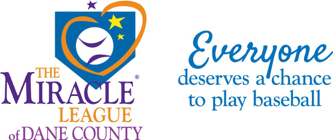History of The Miracle League
In 1997, Rockdale (GA) Youth Baseball Association’s coach Eddie Bagwell invited the first disabled child, Michael, to play baseball on his team; Michael, a 7 year-old child in a wheelchair, had previously attended every game and practice, while cheering on his 5 year-old brother.
And in 1998, the Rockdale Youth Baseball Association (RYBA) formed the Miracle League to further its mission of providing opportunities for all children to play baseball regardless of their ability. The disabled children in the community had expressed the desire to dress in uniforms, make plays in the field, and round the bases just like their fully-abled peers. The league began with 35 players on four teams.
Because there were no programs for the Miracle League to copy, it was decided that:
- Every player bats once each inning
- All players are safe on the bases
- Every player scores a run before the inning is over (last one up gets a home run)
- Community volunteers serve as “buddies” to assist the players
- Each team and each player wins every game
- A safe playing surface for players in wheelchairs, on crutches, with walkers, etc. had to be established
In its spring 1999 season, the Miracle League gained support and became a source of pride for all involved, as participation grew to over 50 players. During that season, the magnitude of the need for such a program was recognized. The Miracle League learned that more than 50,000 children in Metro-Atlanta were disabled to some degree that kept them from participating in team sports. That is when the dream of building a unique baseball complex for these special children was conceived.
The Rotary Clubs of Rockdale County and Conyers (GA) stepped forward to form the Rotary Miracle League Fund, Inc., a 501(c)(3) organization. The new organization had two objectives: (1) raise the funds necessary to build a special complex with facilities that meet the unique needs of the Miracle League players; and (2) assist in the outreach efforts for Miracle Leagues across the country.
With the help of community volunteers and companies, the design and construction of the first Miracle League complex was underway. The complex would include a custom-designed field with a cushioned rubberized surface to help prevent injuries, wheelchair accessible dugouts, and a completely flat surface to eliminate any barriers to players in wheelchairs or with physical impairments. The design also included three grass fields, which could be converted to the synthetic rubber surface as the league grew. In addition, accessible restrooms, a concession stand, and picnic pavilion were included in the design.
The Miracle League complex was completed in April 2000. On opening day, the Miracle League rosters had grown to over 100 players. The players raced around the bases and chatted with their teammates in the dugouts as they celebrated. Nicholas Slade, a player who had been in a coma just a week before, threw out the first ball.
The players’ enthusiasm has continued to grow. By spring, 2002, over 250 players filled the Miracle League rosters. The parents told stories of their children insisting on playing despite bouts with kidney stones, broken bones, and recent hospitalizations.
The thrill of playing, the cheers from the stands, and the friendships they develop make the Miracle League Field an oasis away from a child’s everyday battles.
The Miracle League received the 2008 National Consortium for Academics and Sports Award
To date, there are over 300 Miracle League organizations in the United States (and even a few recent additions in Puerto Rico, Canada, and Australia). The Miracle League is proud to serve over 200,000 children and young adults with disabilities.
The Miracle League has set a goal of establishing 500+ fields in order to serve approximately 1.3 million children. This goal is being realized with the help of communities, volunteers, parents, donators, individual sponsors, and corporate sponsors just like you.
The Miracle League believes, “Everyone deserves a chance to play baseball.”
Contact Information: Bill Schultz, Executive Director – bschultz7782@gmail.com or (608) 575-7580
